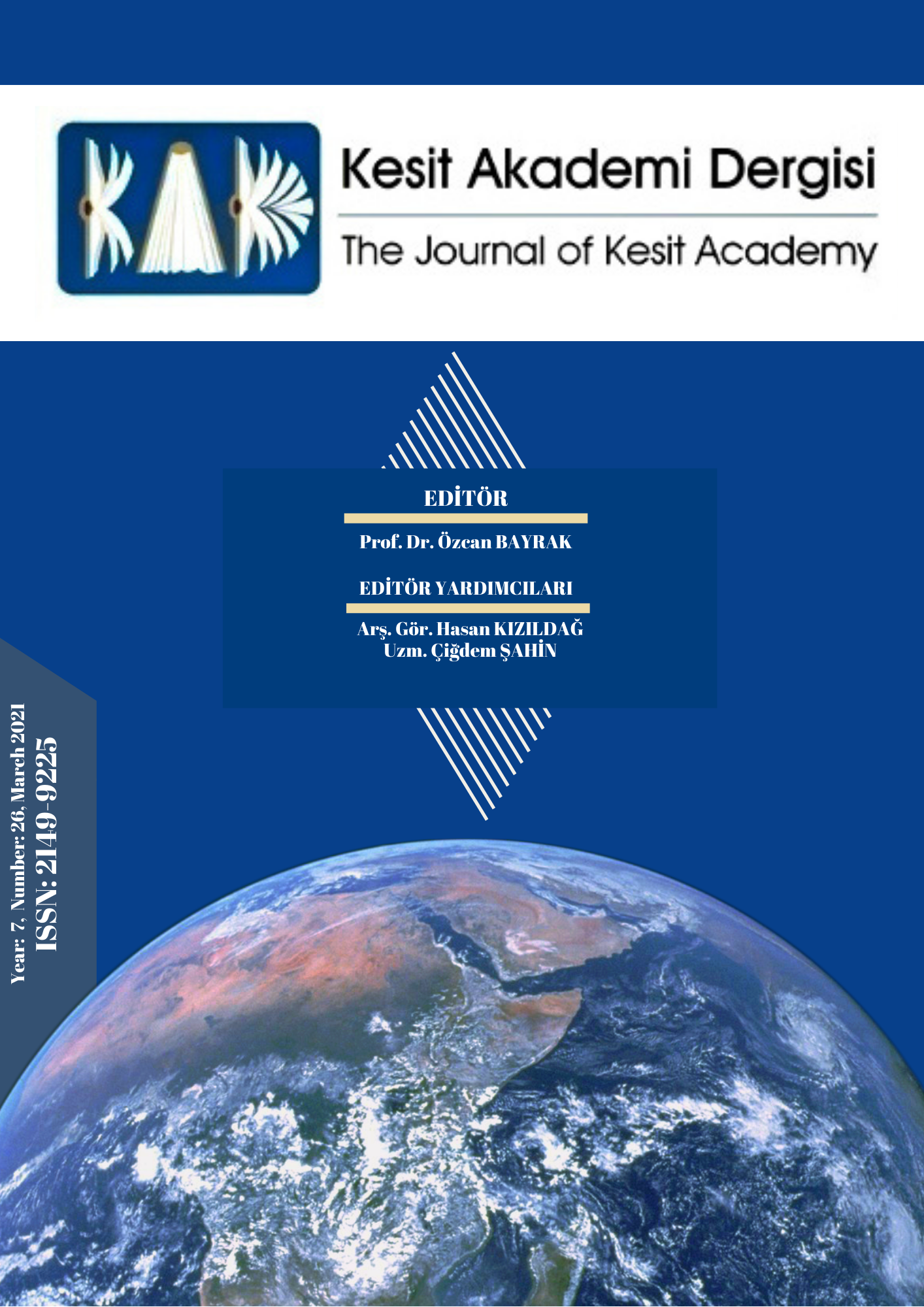Author :
Abstract
Yeni bir kavram olan lovemark ve kurumsal kimlik inşa etmek birçok firma için önemli bir kavramdır. Lovemark tüketicinin psikolojik etkenler doğrultusunda kurumla ilişki kurduğunu öne süren bir kavramdır. Kurum kimliğini konumlandırmada müşteri ile duygusal bağ kuran firmalar tüketicinin satın alma davranışını şekillendirmede psikolojik etkenlere başvurmaktadır. Firmalar tüketici ile duygusal bir bağ kurarak hem satın alma davranışı gerçekleştirmeyi hem de satın alma davranışının tekrarını sağlamayı amaçlamaktadır. Bu araştırmanın amacı ise firmaların lovemark olarak kurumsal kimliklerini nasıl konumlandırdıklarının analiz edilmesidir. Bu kapsamda Mediacat’in 2018 yılında açıkladığı lovemark firmalarından beyaz eşya ve otomobil sektöründe faaliyet gösteren 16 firmaya ait 160 adet reklam filmi incelenmiştir. Her firma için rastgele örneklem yöntemiyle seçilen on reklam filmi içerik çözümlemesi yöntemiyle analize tabi tutulmuştur. Reklam filmlerinde, kurumsal kimlik, sıra dışılık, tutku ve bağlılık boyutları ve bu boyutların birbirleri ile olan ilişkisi irdelenmiştir. Elde edilen bulgulara göre araştırmaya dahil olan firmalar, Volkswagen, Bmw, Mercedes, Renault, Ford, Fiat, Toyota, Audi ve Hyundai otomobil segmentinde; Arçelik ,Bosch, Beko ,Vestel, Samsung ,Siemens, Profilo beyaz eşya segmentinde değerlendirilmiştir. Elde edilen bulgularda firmaların reklam filmi yaratırken başta aşk, haz, güven, gibi duygusal kavramlarla satın alma davranışı için ikna edilmeye çalışıldığı gözlemlenmiştir.
Keywords
Abstract
Lovemark, as a new concept is an important for many companies when building corporate identity. Lovemark is a concept suggestings that the consumer has a relationship with the institution in accordance with psychological factors. Companies that establish an emotional connection with the customer in positioning the corporate identity resort to psychological factors in shaping the consumer's purchasing behavior. Companies aim to achieve both purchasing behavior and repetition of purchasing behavior by creating an emotional connection with the consumer. The aim of this research is to analyze how companies position their corporate identities as lovemark. In this context, 160 advertising films belonging to 16 companies operating in the white household goods and automobile sectorfrom lovemark companies announced by Mediacat in 2018 were examined. Ten advertising films selected by random sampling method for each company were analyzed by content analysis method. In advertising films, the dimensions of corporate identity, uniqueness, passion and commitment and the relationship of these dimensions with each other were examined. According to the results obtained, the companies, Volkswagen, Bmw, Mercedes, Renault, Ford, Fiat, Toyota, Audi and Hyundai involved in the research were evaluated to be in the car segment; Arçelik, Bosch, Beko, Vestel, Samsung, Siemens, Profilo as white goods segment. In the results obtained, it was observed that companies try to convince them firms to buy behavior with emotional concepts such as love,pleasure,trust, when creating advertising films.
Keywords
- Aaker, J. L. (2018). Dimensions of Brand Personality. Journal of Marketing Research, Vol. 34, No. 3 (Aug, 1997). pp. 347-356 Published by: American Marketing Association.
- Aaker, A.D. (1996). Güçlü Markalar Yaratmak. Mediacat: İstanbul.
- Aaker, A.D. (2014). Markalama Başarıya Ulaştıran 20 Temel İlke. Mediacat: İstanbul.
- Balmer, J. M.T. Gray and Edmund, R. (1997). Corporate Identity and Corporate Communicati- ons: Creating a Competitive Advantage. Industrial and Commercial Training, Vol:32, 2000, 256.
- Bazarcı, S. (2017). Tüketicilerin Kişilik Özelliklerinin Reklamda Mesaj Stratejisinin Belirlenme- sindeki Etkisi, Kesit Akademi Dergisi, 3 (11), 561-577.
- Carroll, B.A. and Ahuvia, A.C. (2006). Some Antecedents and Outcomes of Brand Love. Marke- ting Letter, 17(2), pp. 79-89.
- Dowling, G. (1997). Company Image Into a Corporate Ofset. Long Rang Planning, Vol: 26, 21-23.
- Dönmez, M.S. (2020). Lovemark Algısının Sponsor Firmaya Transferi. Tokat Gaziosmanpaşa Üni- versitesi Sosyal Bilimler Araştırmaları Dergisi. 15 (2), 576-589.
- Keller, K. L.(1993). Conceptualizing, Measuring and Managing Customer. Journal of Marketing, 57, 1-22.
- Kotler, P. (2017). A’dan Z’ye Pazarlama. Mediacat: İstanbul.
- Kotler, P. ve G. Armstrong. (2004). Principles of Marketing. New Jersey: Prentice Hall.
- Maier, H.D. (1993).Corporate Identy und marketing-Identitaet, corporate Identity: Grundlagen, funktionen, Fallbeispiele, 6. Auflage, Landsberg/Lech: verlag Moderne Industrie.
- Peltekoğlu, F. (2016). Halkla İlişkiler Nedir? Beta Yayınları, İstanbul.
- Regenthal, G. (2009). Ganzheitliche Corporate Identity. Gabler: Wesbade.
- Roberts, K. (2005) Lovemarks. Power House Books: London.
- Rubin, Zick. (1970). Measurement of Romantic Love. Journal of Personality and Social Psychology. 16, 265-273.
- Schmıdt, K. (1996). Corporate Identity Entwikchlung. Verstand und potentiale Corporate ıdentity in Europa: Strategien, ınstrumente, Erfogreiche Beispiele, Frankfurt .
- Schmitt,B. (2011). Experience Marketing: Concepts, Frameworks and Consumer Insights. Foun- dations and TrendsR in Marketing, Vol. 5, No. 2, 55–112.
- Sharp, B. (2016). Markalar Nasıl Büyür? Pazarlamacıların Bilmedikleri Şeyler. İstanbul: Sinpaş GYO kitapları.
- Shimp, T A. and Madden, T. J. (1988). Consumer-Object Relations: A Conceptual Framework Based Analogously on Sternberg’s Triangular Theory of Love. Advances in Consumer Research, 15, 163-168.
- Sternberg, RJ. A (1986). Triangular Theory of Love. Psychol Rev,93: 119-135.
- Şayan, A. (2020). Marka Bağlılığı Yaratmada Sosyal Medyanın Rolü: Lovemark’s Örnekleri Üze- rine Bir Araştırma. Uluslararası Ders Kitapları ve Eğitim Materyalleri Dergisi, 3 (1), 319342.
- Walizer, M.H. and Wienir, P.L.(1978). Reserarch methods and analysis. New York: Harper& Row.
- Wimner, R.D. and Dominick, J.R. (2000). Mass Media Research: An Introduction. Belmont, CA: Wadswort.
- https://sozluk.gov.tr/ (Erişim Tarihi: 24 Aralık 2020).





